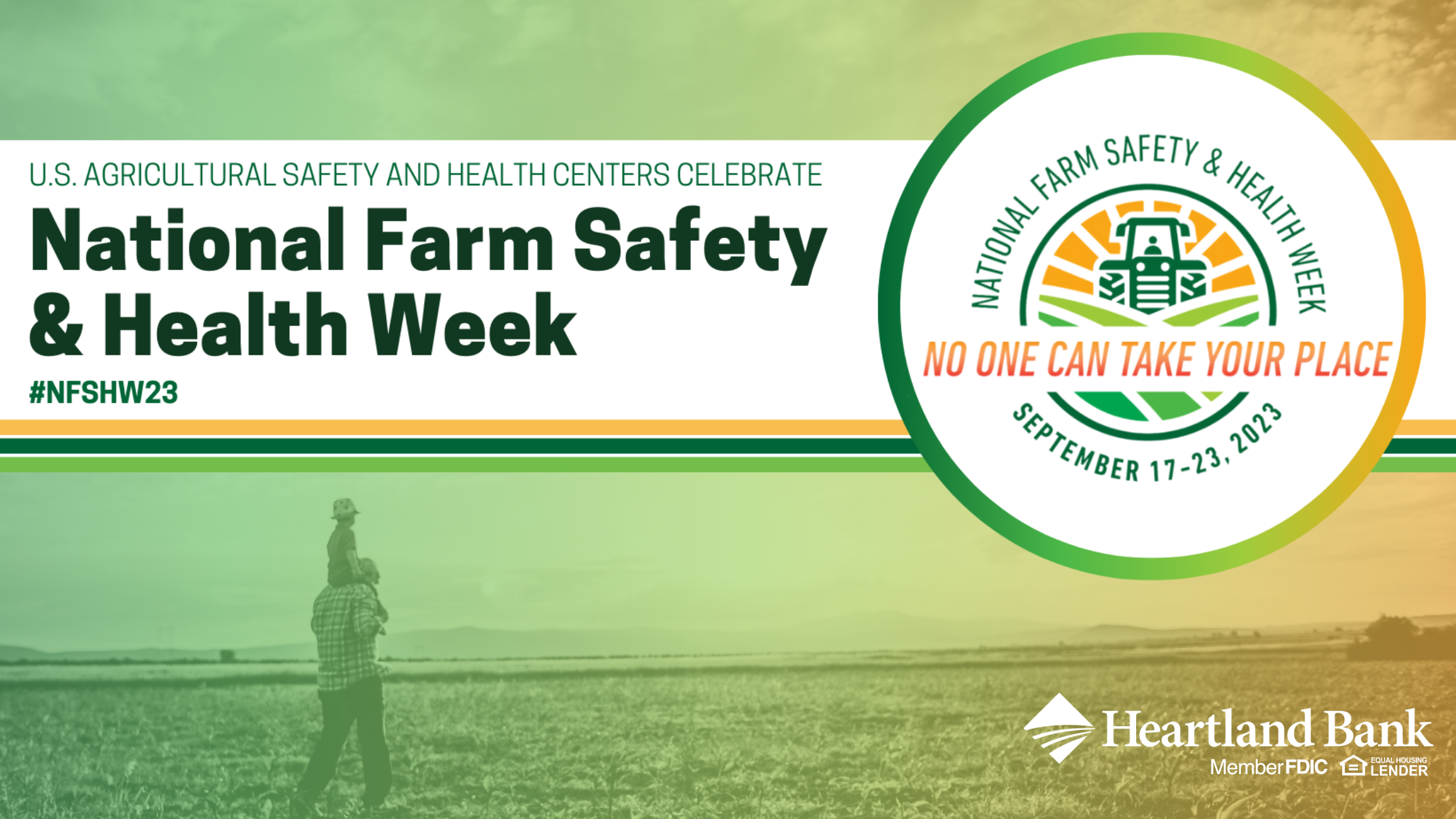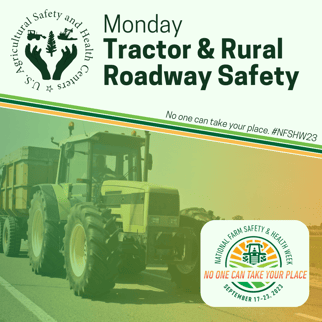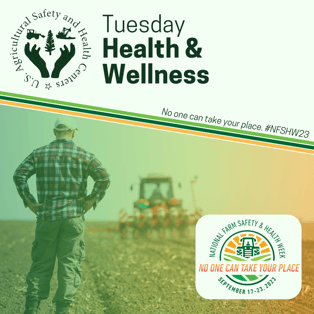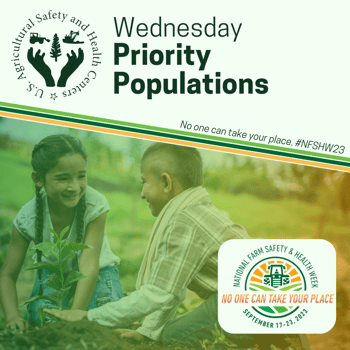
As we enter one of the busiest and most dangerous times of the year for the ag industry, the National Education Center for Agriculture Safety (NECAS) is reminding people the importance of prioritizing farm safety.
Coinciding with the beginning of harvest, the third week of September has been recognized as National Farm Safety and Health Week by the National Safety Council since it's proclamation in 1944.
Monday (9/18): Tractor & Rural Roadway Safety
Tuesday (9/19): Health and Wellness
Wednesday (9/20): Priority Populations
Thursday (9/21): Confined Spaces in Agriculture
Friday (9/22): Brain Health
Tractor & Rural Roadway Safety
Tractors are nearly universal on the farm. While a critical piece of equipment, tractors are also the number one cause of death on the farm.

- Have pre-operational checks been completed before driving such as oil, tire pressure and gas. Check the area around the tractor to ensure it is clear of children, dogs, etc.
- Has the machine been disinfected between operators?
- Are drivers entering the tractor with three points of contact to prevent falls?
- Does the tractor have working lights and a slow-moving vehicle sign when being driven on roadways?
- Are tractors equipped with rollover protective structures (ROPS) and seat belts?
- Are power take-off (PTO) guards in place and in good condition?
- Are hydraulic lines in good shape, with no leaks?
- Are drivers checking for other workers before moving the tractor?
- Are you keeping kids off tractors and out of the area they are being used?
- Are there no extra riders? This maintains safe tractor operation and physical distancing.
- Are implements only attached to the tractor once the tractor is turned off, on level ground and the brakes applied?
- Are drivers reducing speed on hills and steep slopes?
- Are all drivers trained and have they received necessary certifications or licensures?
Many collisions also occur when motorists pass farm vehicles. Some farm operators haul equipment that is extra wide or long, which motorists don’t consider when they plan to pass.
Be patient. Don’t assume the farmer can move aside to let you pass. Shoulders may be soft, wet, or steep, which can cause the farm vehicle to tip, or they may not be able to support a heavy farm vehicle.
Make sure you’re clear. When passing, make sure you can see the farm vehicle in your rear-view mirror before you get back in your lane. Enjoy the drive. Even if you have to slow down to 20 mph and follow a tractor for two miles, it takes only six minutes of your time, about the same as waiting for two stoplights.
Health & Wellness: Keep fatigue and stress levels under control
Farming is a physically and mentally demanding career. Fatigue and stress often lead to debilitating consequences, including safety and well-being issues.

Stay hydrated and well-nourished. Dehydration intensifies the effects of fatigue like headaches, dizziness, tiredness, and dry mouth. Drinking plenty of water and eating healthy, regular, protein-rich meals and snacks are important to fuel alertness and energy.
Prioritize rest. Despite long hours, a good night's sleep and taking short breaks throughout the day are essential to combating fatigue and stress. Research shows that fatigue and stress can have serious negative impacts on both your body and mental health.
Know the signs. Common signs of fatigue include loss of concentration, reduced attention span, being distracted easily, and the feeling of zoning out.
Seek professional help. According the CDC, suicide rates in agriculture are higher than in other sector. If you ever feel your stress levels are hindering your ability to perform your job or live your life to the fullest, the best step to take is seeking professional help.
Priority Populations
Who's at Risk on the Farm?
Answer: School Aged Children
According to the University of Nebraska Medical Center (UNMC), 60% of children were not working when they were injured in agriculture.

Compared to all other industries combined, youth fatalities occur most often in agriculture, and 48% of all fatal injuries to youth workers occurred in agriculture.
The most fatal events for children are transportation incidents - primarily tractor and ATV/UTV accidents.
Ways to prevent: Educate and train children, provide personal protective equipment, and supervise children.
Confined Spaces in Agriculture: Grain engulfment and entrapment
Activities associated with grain handling and storage pose a variety of risks to safety and health of workers, including entrapment and suffocation in grain, falls from structures or catwalks, entanglement in grain moving machinery, toxic atmospheres, electrocution, and dust explosions.

The best ways to prevent engulfment incidents are to eliminate the reasons for entering a bin in the first place, and to restrict unauthorized access by youth or other individuals who may be unaware of hazards.
Manage grain to prevent spoilage. The most common reason victims enter bins is to address problems associated with spoiled grain.
Work from outside the bin. If clumps or crusts develop in the grain, use a pole from outside the bin to probe or knock the clump-free.
Restrict access to bins, storage structures, and outdoor grain storage piles. Post signage and lock access doors so unauthorized persons, bystanders, and youth cannot enter.
Plan ahead for occasions when entry is absolutely necessary:
- Provide training
- Have an emergency rescue plan in place and follow it
- Shut down all grain loading and unloading equipment
- Evaluate the atmosphere
Brain Health: Resources for farmers
Whether you are a beginning farmer or have been farming for decades, it is important to know what resources are available to assist you in your farming venture. There are many resources available, but it can be cumbersome to sort through them all.

The following organizations, provided by the Center for Rural Affairs, work diligently to serve farmers and ranchers, whether it be through education, technical assistance, mediation, or counseling.
Feel free to reach out to these organizations with any questions you may have – they are here to help you!
Center for Rural Affairs
402.687.2100
www.cfra.org
The Center for Rural Affairs operates a farmer helpline to answer questions regarding farm bill programs that can help you get started in farming or ranching as beginners, implement conservation programs, or even transition to organic farming.
Through work with an established network of farm organizations, the Center for Rural Affairs also makes referrals to other organizations that may better address the question or concern of the farmer.
Community Crops
402.474.9802
communitycrops.org/
Community Crops, located in Lincoln, Nebraska, started as one community garden in 2003. Community Crops now includes 12 community garden sites, a training farm, a Community Supported Agriculture (CSA) program, and more.
Low-income farmers or aspiring farmers from urban areas are able to rent low-cost land and tools on the Community Crops farm. Community Crops also provides 12-week courses during the winter to address a variety of topics, including: business planning, technical production assistance, seed-saving, crop planning, irrigation systems, food safety, etc.
Farm Aid
800.FARM.AID (800.327.6243)
www.farmaid.org/our-work/resources-for-farmers/
Farm Aid has an extensive network across the United States and is able to connect farmers to the best resources in their local area. The Farm Aid Online Directory includes more than 750 organizations with resources to assist farmers in a variety of areas. Farm Aid has also developed a series of Farmer Resource Guides, providing valuable information on farm start-ups, sustainable agriculture, legal issues in farming, farm financing, farm activism and organizing, etc.
Kansas Agricultural Mediation Services (KAMS)
800.321.FARM (800.321.3276)
ksre.k-state.edu/kams/
Kansas Agricultural Mediation Services (KAMS) is an official U.S. Department of Agriculture (USDA) certified state agricultural mediation program for Kansas. For more than 30 years, KAMS has helped farmers and ranchers explore options through mediation as well as other financial and legal concerns they might have. KAMS helps with appeal options for USDA adverse decisions: farm loan delinquency, denial, or adverse decisions for USDA farm programs. Also, KAMS helps producers prepare for mediation through support services such as agricultural financial counseling and legal assistance. Talk to an attorney over the phone at no cost.
Nebraska Farmers Union (NeFU)
402.476.8815
nebraskafarmersunion.org
The Nebraska Farmers Union (NeFU) is a founding member of the Nebraska Rural Response Hotline. NeFU plays an active role in the farm bill and works on grassroots driven policy. Through their work, NeFU has developed well-established connections with various farm organizations, and is able to make referrals for any farm questions they may receive.
Nebraska Rural Response Hotline
8004.464.0258
farmhotline.com
The Nebraska Rural Response Hotline is a primary service provided by the Rural Response Council through Interchurch Ministries of Nebraska. Farmers, ranchers, and rural residents can call the hotline and speak directly to an experienced staff person. With an extensive network, staff are able to assist over the phone and also make referrals to attorneys, financial counselors, clergy, other farmers, and mediation services as needed.
In addition, staff can assist callers with stress, depression, or other mental health concerns through the COMHT (Counseling, Outreach, and Mental Health Therapy) Program.
Heartland Bank is a family-owned community bank serving 15 Nebraska locations, committed to improving the lives of our customers, associates, and communities. We’re proud to be a seven-time honoree on American Banker’s Best Banks to Work For list.
